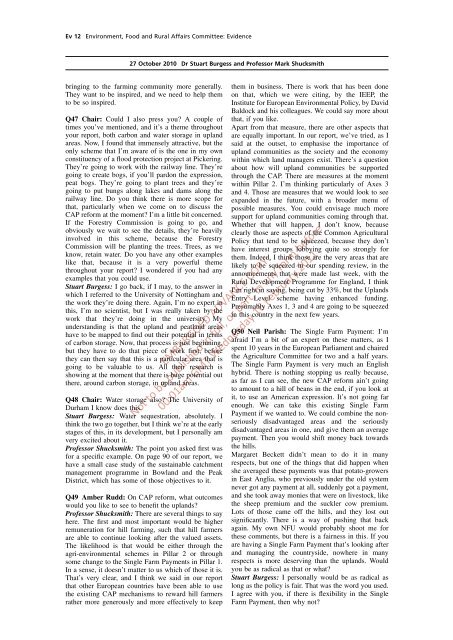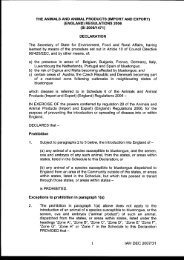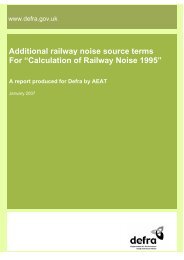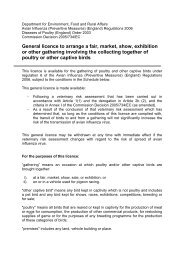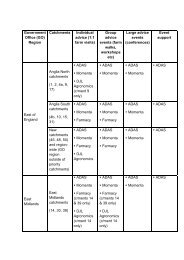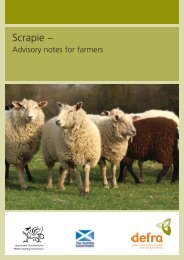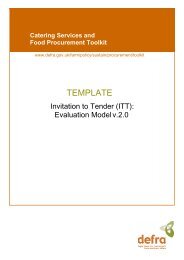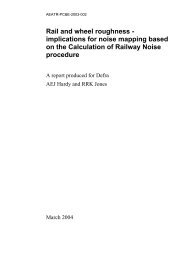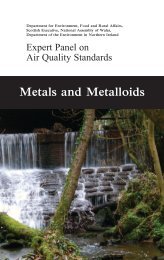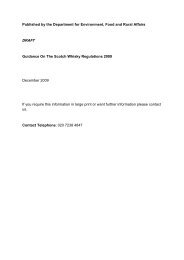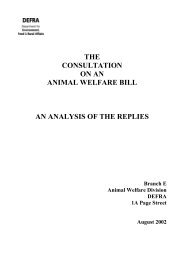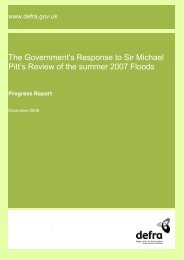Farming in the Uplands - ARCHIVE: Defra
Farming in the Uplands - ARCHIVE: Defra
Farming in the Uplands - ARCHIVE: Defra
Create successful ePaper yourself
Turn your PDF publications into a flip-book with our unique Google optimized e-Paper software.
Ev 12 Environment, Food and Rural Affairs Committee: Evidence<br />
27 October 2010 Dr Stuart Burgess and Professor Mark Shucksmith<br />
br<strong>in</strong>g<strong>in</strong>g to <strong>the</strong> farm<strong>in</strong>g community more generally.<br />
They want to be <strong>in</strong>spired, and we need to help <strong>the</strong>m<br />
to be so <strong>in</strong>spired.<br />
Q47 Chair: Could I also press you? A couple of<br />
times you’ve mentioned, and it’s a <strong>the</strong>me throughout<br />
your report, both carbon and water storage <strong>in</strong> upland<br />
areas. Now, I found that immensely attractive, but <strong>the</strong><br />
only scheme that I’m aware of is <strong>the</strong> one <strong>in</strong> my own<br />
constituency of a flood protection project at Picker<strong>in</strong>g.<br />
They’re go<strong>in</strong>g to work with <strong>the</strong> railway l<strong>in</strong>e. They’re<br />
go<strong>in</strong>g to create bogs, if you’ll pardon <strong>the</strong> expression,<br />
peat bogs. They’re go<strong>in</strong>g to plant trees and <strong>the</strong>y’re<br />
go<strong>in</strong>g to put bungs along lakes and dams along <strong>the</strong><br />
railway l<strong>in</strong>e. Do you th<strong>in</strong>k <strong>the</strong>re is more scope for<br />
that, particularly when we come on to discuss <strong>the</strong><br />
CAP reform at <strong>the</strong> moment? I’m a little bit concerned.<br />
If <strong>the</strong> Forestry Commission is go<strong>in</strong>g to go, and<br />
obviously we wait to see <strong>the</strong> details, <strong>the</strong>y’re heavily<br />
<strong>in</strong>volved <strong>in</strong> this scheme, because <strong>the</strong> Forestry<br />
Commission will be plant<strong>in</strong>g <strong>the</strong> trees. Trees, as we<br />
know, reta<strong>in</strong> water. Do you have any o<strong>the</strong>r examples<br />
like that, because it is a very powerful <strong>the</strong>me<br />
throughout your report? I wondered if you had any<br />
examples that you could use.<br />
Stuart Burgess: I go back, if I may, to <strong>the</strong> answer <strong>in</strong><br />
which I referred to <strong>the</strong> University of Nott<strong>in</strong>gham and<br />
<strong>the</strong> work <strong>the</strong>y’re do<strong>in</strong>g <strong>the</strong>re. Aga<strong>in</strong>, I’m no expert <strong>in</strong><br />
this, I’m no scientist, but I was really taken by <strong>the</strong><br />
work that <strong>the</strong>y’re do<strong>in</strong>g <strong>in</strong> <strong>the</strong> university. My<br />
understand<strong>in</strong>g is that <strong>the</strong> upland and peatland areas<br />
have to be mapped to f<strong>in</strong>d out <strong>the</strong>ir potential <strong>in</strong> terms<br />
of carbon storage. Now, that process is just beg<strong>in</strong>n<strong>in</strong>g,<br />
but <strong>the</strong>y have to do that piece of work first, before<br />
<strong>the</strong>y can <strong>the</strong>n say that this is a particular area that is<br />
go<strong>in</strong>g to be valuable to us. All <strong>the</strong>ir research is<br />
show<strong>in</strong>g at <strong>the</strong> moment that <strong>the</strong>re is huge potential out<br />
<strong>the</strong>re, around carbon storage, <strong>in</strong> upland areas.<br />
Q48 Chair: Water storage also? The University of<br />
Durham I know does this.<br />
Stuart Burgess: Water sequestration, absolutely. I<br />
th<strong>in</strong>k <strong>the</strong> two go toge<strong>the</strong>r, but I th<strong>in</strong>k we’re at <strong>the</strong> early<br />
stages of this, <strong>in</strong> its development, but I personally am<br />
very excited about it.<br />
Professor Shucksmith: The po<strong>in</strong>t you asked first was<br />
for a specific example. On page 90 of our report, we<br />
have a small case study of <strong>the</strong> susta<strong>in</strong>able catchment<br />
management programme <strong>in</strong> Bowland and <strong>the</strong> Peak<br />
District, which has some of those objectives to it.<br />
Q49 Amber Rudd: On CAP reform, what outcomes<br />
would you like to see to benefit <strong>the</strong> uplands?<br />
Professor Shucksmith: There are several th<strong>in</strong>gs to say<br />
here. The first and most important would be higher<br />
remuneration for hill farm<strong>in</strong>g, such that hill farmers<br />
are able to cont<strong>in</strong>ue look<strong>in</strong>g after <strong>the</strong> valued assets.<br />
The likelihood is that would be ei<strong>the</strong>r through <strong>the</strong><br />
agri-environmental schemes <strong>in</strong> Pillar 2 or through<br />
some change to <strong>the</strong> S<strong>in</strong>gle Farm Payments <strong>in</strong> Pillar 1.<br />
In a sense, it doesn’t matter to us which of those it is.<br />
That’s very clear, and I th<strong>in</strong>k we said <strong>in</strong> our report<br />
that o<strong>the</strong>r European countries have been able to use<br />
<strong>the</strong> exist<strong>in</strong>g CAP mechanisms to reward hill farmers<br />
ra<strong>the</strong>r more generously and more effectively to keep<br />
<strong>the</strong>m <strong>in</strong> bus<strong>in</strong>ess. There is work that has been done<br />
on that, which we were cit<strong>in</strong>g, by <strong>the</strong> IEEP, <strong>the</strong><br />
Institute for European Environmental Policy, by David<br />
Baldock and his colleagues. We could say more about<br />
that, if you like.<br />
Apart from that measure, <strong>the</strong>re are o<strong>the</strong>r aspects that<br />
are equally important. In our report, we’ve tried, as I<br />
said at <strong>the</strong> outset, to emphasise <strong>the</strong> importance of<br />
upland communities as <strong>the</strong> society and <strong>the</strong> economy<br />
with<strong>in</strong> which land managers exist. There’s a question<br />
about how will upland communities be supported<br />
through <strong>the</strong> CAP. There are measures at <strong>the</strong> moment<br />
with<strong>in</strong> Pillar 2. I’m th<strong>in</strong>k<strong>in</strong>g particularly of Axes 3<br />
and 4. Those are measures that we would look to see<br />
expanded <strong>in</strong> <strong>the</strong> future, with a broader menu of<br />
possible measures. You could envisage much more<br />
support for upland communities com<strong>in</strong>g through that.<br />
Whe<strong>the</strong>r that will happen, I don’t know, because<br />
clearly those are aspects of <strong>the</strong> Common Agricultural<br />
Policy that tend to be squeezed, because <strong>the</strong>y don’t<br />
have <strong>in</strong>terest groups lobby<strong>in</strong>g quite so strongly for<br />
<strong>the</strong>m. Indeed, I th<strong>in</strong>k those are <strong>the</strong> very areas that are<br />
likely to be squeezed <strong>in</strong> our spend<strong>in</strong>g review, <strong>in</strong> <strong>the</strong><br />
announcements that were made last week, with <strong>the</strong><br />
Rural Development Programme for England, I th<strong>in</strong>k<br />
I’m right <strong>in</strong> say<strong>in</strong>g, be<strong>in</strong>g cut by 33%, but <strong>the</strong> <strong>Uplands</strong><br />
Entry Level scheme hav<strong>in</strong>g enhanced fund<strong>in</strong>g.<br />
Presumably Axes 1, 3 and 4 are go<strong>in</strong>g to be squeezed<br />
<strong>in</strong> this country <strong>in</strong> <strong>the</strong> next few years.<br />
Q50 Neil Parish: The S<strong>in</strong>gle Farm Payment: I’m<br />
afraid I’m a bit of an expert on <strong>the</strong>se matters, as I<br />
spent 10 years <strong>in</strong> <strong>the</strong> European Parliament and chaired<br />
<strong>the</strong> Agriculture Committee for two and a half years.<br />
The S<strong>in</strong>gle Farm Payment is very much an English<br />
hybrid. There is noth<strong>in</strong>g stopp<strong>in</strong>g us really because,<br />
as far as I can see, <strong>the</strong> new CAP reform a<strong>in</strong>’t go<strong>in</strong>g<br />
to amount to a hill of beans <strong>in</strong> <strong>the</strong> end, if you look at<br />
it, to use an American expression. It’s not go<strong>in</strong>g far<br />
enough. We can take this exist<strong>in</strong>g S<strong>in</strong>gle Farm<br />
Payment if we wanted to. We could comb<strong>in</strong>e <strong>the</strong> nonseriously<br />
disadvantaged areas and <strong>the</strong> seriously<br />
disadvantaged areas <strong>in</strong> one, and give <strong>the</strong>m an average<br />
payment. Then you would shift money back towards<br />
<strong>the</strong> hills.<br />
Margaret Beckett didn’t mean to do it <strong>in</strong> many<br />
respects, but one of <strong>the</strong> th<strong>in</strong>gs that did happen when<br />
she averaged <strong>the</strong>se payments was that potato-growers<br />
<strong>in</strong> East Anglia, who previously under <strong>the</strong> old system<br />
never got any payment at all, suddenly got a payment,<br />
and she took away monies that were on livestock, like<br />
<strong>the</strong> sheep premium and <strong>the</strong> suckler cow premium.<br />
Lots of those came off <strong>the</strong> hills, and <strong>the</strong>y lost out<br />
significantly. There is a way of push<strong>in</strong>g that back<br />
aga<strong>in</strong>. My own NFU would probably shoot me for<br />
<strong>the</strong>se comments, but <strong>the</strong>re is a fairness <strong>in</strong> this. If you<br />
are hav<strong>in</strong>g a S<strong>in</strong>gle Farm Payment that’s look<strong>in</strong>g after<br />
and manag<strong>in</strong>g <strong>the</strong> countryside, nowhere <strong>in</strong> many<br />
respects is more deserv<strong>in</strong>g than <strong>the</strong> uplands. Would<br />
you be as radical as that or what?<br />
Stuart Burgess: I personally would be as radical as<br />
long as <strong>the</strong> policy is fair. That was <strong>the</strong> word you used.<br />
I agree with you, if <strong>the</strong>re is flexibility <strong>in</strong> <strong>the</strong> S<strong>in</strong>gle<br />
Farm Payment, <strong>the</strong>n why not?<br />
EMBARGOED ADVANCE COPY:<br />
Not to be published <strong>in</strong> full, or part, <strong>in</strong> any form before<br />
00.01am GMT Wednesday 16 February 2011


